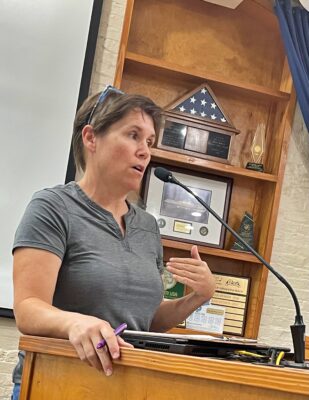
Joyce Tuten speaks against rollback
After 50 minutes of debate over the city’s rollback property tax millage rate, majority rule was victorious Tuesday as three city commissioners voted to set the tentative millage rate at 4.8298 mills, which is the rollback rate.
Before the vote, all nine of the public speakers opposed adopting the rollback rate. And, two city commissioners, James Antun and Chip Ross, also argued against it.
But in a final statement of support for the rate before the 3-2 vote, Mayor Bradley Bean reached into the 2020 U.S. Census to talk about the poverty level of Fernandina Beach.
“I want to draw attention to our community itself,” Bean said. “Would you believe that within the city limits we have a higher poverty rate than the national average? You are more likely to be in poverty in Fernandina than if you lived anywhere else randomly in the county.
“We have people living here that are hurting. If you own your home, sure it’s capped at 3% … but if you’re someone below that poverty line or someone likely who is a renter, you are not in a homestead protected property.
“The taxes go up at that 10% rate. It’s been over a decade since we didn’t raise your taxes. We’re not lowering them, we’re simply not raising them.”
According to the U.S. ensus, Fernandina Beach has a poverty rate of 10.2%. Bean apparently confused his facts, as the U.S. Census reported the national rate at 11.2% from 2019-21, the most recent statistics.
The rollback property tax rate is the tax rate that would be required to generate the same amount of tax revenue for the city as the previous year, taking into account changes in property values and assessment rates.
According to city officials, the rollback rate will generate an estimated $364,528 over 2022-23. The adjusted rollback rate would generate $879,195 and the current millage rate of 5.3330 would produce $2,252,606 more revenue.
Bean, Vice Mayor David Sturges and Commissioner Darron Ayscue were lockstep in casting votes for the rollback rate.
“I think this year and until we can get a new city manager onboard I’m in favor of going to the full rollback rate,” Ayscue said. “I think we can do a lot of things in our budget workshops, but right now I think that’s what is best until we get a new city manager and we can talk about those adjusted rollback rates and the projects we’re looking to fund with that.”
Sturges maintains there is $1 million in uncommitted funds in the budget that the city commission can use to decide what projects are worthy of funding.
“I do think we have room for some projects, and we don’t have to go to the adjusted rollback rate to do them,” he said.
Commissioner Ross remained steadfast in opposing the rollback millage rate as he has in past commission discussions about the 2023-24 proposed budget.
“This commission is guaranteeing they don’t want to raise fees, they don’t want to raise taxes, they don’t want to do anything but they want to fund everything,” Ross said. “And despite what some people think, you can’t have your cake and eat it too. I understand about raising taxes, but I also understand that people come here for quality of life and that quality of life costs money.”
Commissioner Antun said he would like his fellow commissioners to consider going to the adjusted rollback rate.
“Things like our biking trail which I think is going to be a long term investment and reducing wear and tear on our roads. I’d also like to charge our new city manager with finding three to five other projects we would have deferred to use the rest of that money,” Antun said.
But the motion to adopt the adjusted rollback rate (4.9670) failed with only Antun and Ross voting for it.
Joyce Tuten of Conserve Nassau was among the speakers questioning going to the rollback rate.
“We have many concerns about going to the rollback rate,” Tuten said. “Our primary concern is conservation. We have a limited amount of land on a barrier island. The rollback rate is very black and white and it gets instant cheers from some people, but for a lot of people it doesn’t. As leaders it’s your job to explain the ‘gray’ of the demand for a higher (tax) rate.”
Tuten spoke about rising temperatures and the need for the city protect and increase the maritime forest to keep the city cooler for future generations.
“You guys have kids or grandkids you love, you do it for them,” she said. “We need conservation to provide shade, clean air, clean water, habitat and keep our soil conservation for our mental health. We need (all this) to keep the city cool.”
The city commission will hold budget workshops and public hearings in August and September to approve where budget cuts will be taken, primarily from capital improvements. Interim City Manager Charlie George said the proposed 2023-24 budget would require cutting $2.5 million out of the budget to make the rollback rate.
With the 3-2 vote, the city commission may lower the tentative millage rate in a final vote even further after discussions, but may not raise the rate.The next city commission budget workshop is slated for Aug. 1.

We are in a strong economic cycle with low unemployment – a time of good economic growth
While cost increases are unwelcome by most everyone, NOT increasing revenue while times are good virtually guarantees real economic pain when things turn down. A wise enterprise invests for the future when times are good – as they are now
What will the city be cutting that could lead to real pain in a few years’ time? (think Brett’s…)
It is always interesting to hear the opinion of non-City residents advocating for higher taxes on City residents … presumably so the City can provide more services they themselves can enjoy.